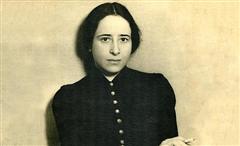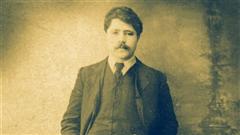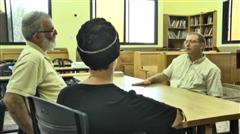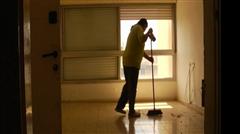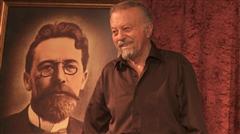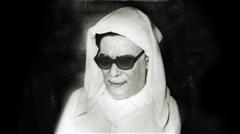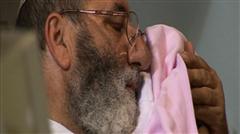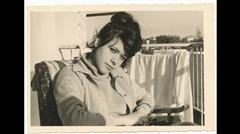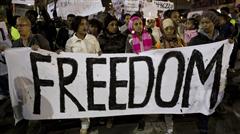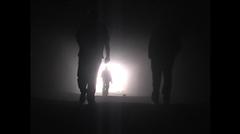A personal spiritual biography of the Jewish philosopher, Hannah Arendt, who coined the controversial phrase “The Banality of Evil,” in her book Eichmann in Jerusalem. The movie tracks the connections between her life story and her thinking, through rare archival footage demonstrating the Banality of Evil. Her Ideas on the nature of Evil, pluralism, Freedom, etc., are relevant today more than ever.
In 1921, six dead bodies were found near the Red House between Tel Aviv and Jaffa. One was the body of Y.H. Brenner, a brilliant author, the sharp critic of his generation, a man of ambiguous sexuality and the characteristics of a raging prophet; he was well known throughout the Jewish world. An official report, written but sealed shortly after these events, was discovered only recently. It features in this film, along with animated sequences by David Polonsky (“Waltz with Bashir”), conversations with Brenner scholars, rare period stills, and selections from his works.
Gilles and Esther Alexandre struggle with the loss of two sons to suicide committed during their military service, as well as with the resulting condemnation by the religious kibbutz in which they live, which regards suicide as a sin and a source of shame and expects the grieving parents to swallow their pain. The Alexandres refuse to succumb: they launch a public campaign to reshape Jewish Orthodoxy’s discourse on suicide. Now their youngest son Binyamin is preparing to enter the army and wants their permission to join a combat unit. Loyal to his community’s standards, he implores his parents to find another way to commemorate his siblings. All of this poses a serious dilemma for the grieving parents, and forces them to reconsider the way that they confront their pain.
“Broke” is the story of four successful women in their fifties, who believed in education and hard work. They did all the right things, but still lost their jobs and joined the circle of poverty. Though at their prime in terms of ability and experience, the world seems to have lost interest in them. The very idea that “there is no such thing as an embarrassing job” becomes a cruel fact when a former manager, accepts work as an assistant at a day care center or as a cleaner. These women show what life looks like when people become “poor”; they feel overwhelmed by anxiety, worried that they still have thirty years ahead of them with no pension, no property and no way to make a living. Struggling to survive economically and maintain their self-esteem, they must fight to reinvent themselves.
The film follows 81-year-old Albert Cohen as he attempts to direct the play “Chekhov’s Little People” and stage it in his home. Albert’s persistent and uncompromising struggle provides a glimpse into the life of one of the most acclaimed actors in Israeli theater. His journey raises questions about the connection between actor and character, stage and home, creation and life.
Rabbi David Buzaglo was the greatest Hebrew liturgical poet of the twentieth century. Born in Morocco in 1903, his literary output had a major impact on a community of hundreds of thousands of people. From his prolific period in the Diaspora to the years he spent in a ruptured Israel, Buzaglo’s poetry initiated an abrupt shift in Sephardic liturgical writing, but it also served as a vital link between the modern era and a tradition that dates back to Spanish Jewry’s Golden Age. But Buzaglo was more than just a great poet. The actions he took at seminal moments in history had a critical impact in shaping the identity of Maghreb Jews. This film is an intimate look at Buzaglo’s life and career, from its roots in the rich tradition of Hebrew poetry in Morocco through the liturgical revolution in Israel.
Twenty-five years after the death of actress Talia Shapira, her son begins a journey to retrace her life. He combs through the vast belongings his mother left behind – diaries, stories, films, audio tapes – as he peels his memories layer by layer, finally arriving at the most significant moment in their relationship: Talia’s last days.
Seventeen chapters of observation constitute an abstract and emotional mosaic, an intense investigation into the essence and meaning of a dialogue between mother and son – a dialogue that transcends words and time.
The unique way in which the director has chosen to describe this process of deciphering his mother’s life poignantly conveys both the need as well as the inherent difficulities to connect incidental moments of our lives into meaningful stories.
On Christmas Eve 2013, some 10,000 asylum seekers from Eritrea and Sudan gathered in Levinsky Park. From there they marched in an orderly fashion to Ha’Aliya Street, and continued across downtown Tel Aviv, until they reached Rabin Square, where they gathered around Yigal Tomarkin’s looming statue, “Holocaust and Rebirth.” It seemed as if every monument along the way, the names of every street and building added meaning to the demonstration, and transformed these hapless refugees into yet another link in the chain of Tel Aviv’s history.
Micha, the director and protagonist of this film, is very disturbed by historian Uri Milstein’s upcoming, in-depth investigation into what really happened during the Battle of Sultan Yacoub, during the First Lebanon War. In the name of military camaraderie, he supports Ira, the battalion commander, as he prepares for his interviews with Milstein. After all, Micha was Uri’s second in command. But then the nightmares return, and they are filled with memories he tried to suppress. In conversations with other soldiers who were there, he encounters Zagagi, the chief operations officer, who stuns him by saying, “You abandoned your comrades on the battlefield!” Now Micha must contend with the accusation. Can there really be such a disparity between his persona as a bold, charismatic individual and the facts? As he looks his friends and daughters in the eye, he hopes that they will understand. Most of all, he hopes that thirty years later, he can say that the story of Sultan Yacoub is finally over.
